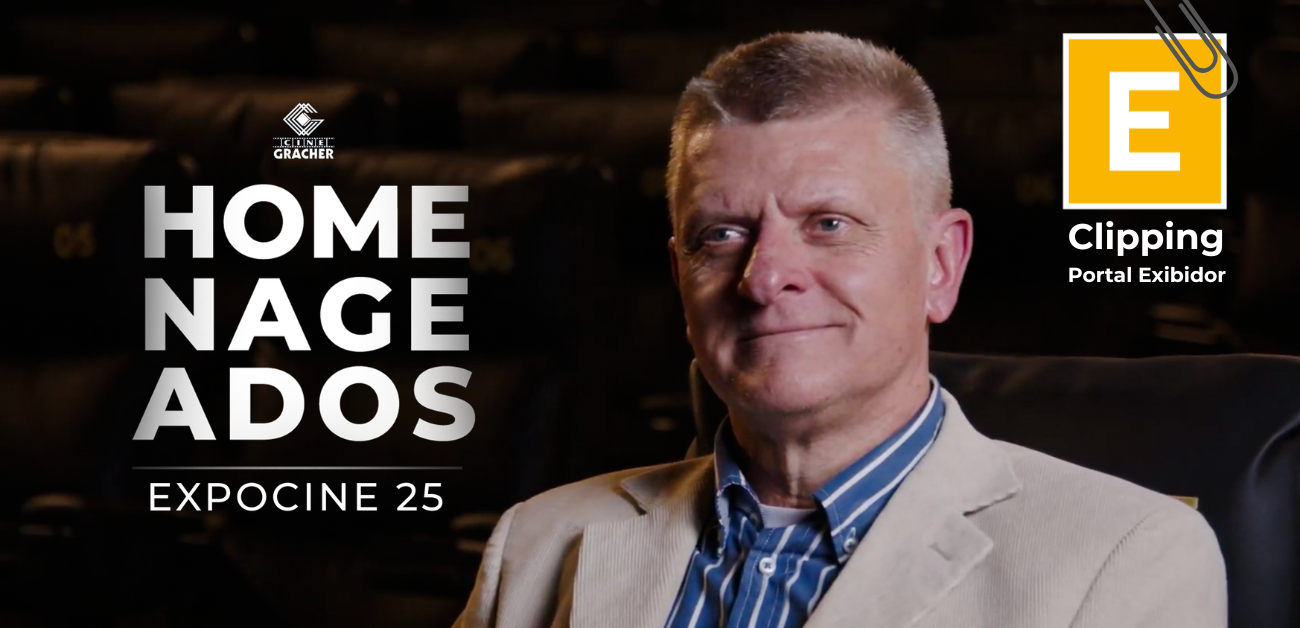Sandro Baran talks about the tribute to the exhibition network that will take place at Expocine 2025
With a history spanning generations and accompanying virtually the entire evolution of film exhibition in Brazil, Cine Gracher reaches a historic milestone: 110 years of operation. Founded in 1915, the chain began as Cine Esperança, then went through different names, such as Cine Guarani and Cine Real, until adopting its current brand, which bears the surname of the family responsible for keeping the tradition of moviegoing alive in the city of Brusque, Santa Catarina, and elsewhere. This year, the chain will be honored at EXPOCINE 25 , recognizing Cine Gracher's contribution to culture and the preservation of the cinematic experience in the country.
Kicking off the series of interviews with Expocinehonorees, Portal Exibidor spoke with Sandro Baran, director of the Cine Gracher chain. The 12th edition of Expocine will take place from September 30th to October 3rd at Cine Marquise, a traditional street cinema in São Paulo, and at the Renaissance Hotel, on the adjacent block.
It is worth noting that, while some questions were asked by our editorial team, part of the interview was taken from the OdeioCinema podcast , which is showing episodes from a partnership between the AdoroCinema and Tonks , the conglomerate that owns the rights to Expocine and the Exhibition Portal .
When Cine Gracher opened in the early 20th century, leisure habits were very different from today. Cinema was still a novelty, and in rural towns, it represented not only entertainment but also a community gathering place. Based on records and accounts from his family, Sandro Baran describes how, in the silent film era, going to the cinema was a full-fledged social event.
"I was born into the cinema. My family already had a movie theater, and from a very young age, I was there with my grandparents, participating, working, disturbing, playing. Cinema is something that inspires me every day. When you walk into a movie theater, you don't even need to be watching the film; you connect... with the dreams, the anxieties, the expectations that the world of cinema can bring you," comments Sandro.
The history of Cine Gracher begins with Sandro's great-grandfather, Carlos Gracher, who, just 20 years after the invention of cinema, opened Cine Esperança in Brusque. It was the silent film era, and going to the theater was also a social event.
"People arrived, formed lines, and greeted each other. The film didn't have a specific start time, because everyone was waiting for the police chief and his wife, who had reserved seats. And at the same time, three musicians played: one on the cavaquinho, another on the violin, and another on the guitar. They stood there to welcome the audience, and when the film began, they tried to follow the scenes, creating the live soundtrack," Baran recalls.
More than a century later, the social and cultural essence of moviegoing remains in the DNA of Cine Gracher . For the director, the industry's strength lies in the collective experience, which goes beyond the screen. Currently, the chain has complexes in nine cities across the three southern states: in addition to Brusque, Cine Gracher is also located in Joaçaba, Pato Branco, São Bento do Sul, Canela, Indaial, Arapongas, Porto União, and Porto Belo.
Cinema plays an important role in the local economy, boosting bars, restaurants, shops, parks, and more. Whether in street cinemas or inside shopping malls, they become a meeting point for people and often end up having an "event" connection with the cinema experience. In smaller cities, cinemas also function as a cultural accelerator and a promoter of cultural access.
"The cinema has a characteristic that you don't go to see a film; you go for an experience, for an event. There's a café where you can have coffee, chat, meet friends, eat popcorn, watch the film, and then continue the meeting at a restaurant or bookstore. You can watch at home; the platforms are there, but there's no way to replicate that entire environment," explains the director.
Celebrating 110 years and tribute at Expocine
Honored at EXPOCINE 25 in the exhibition segment, Sandro Baran believes that preserving history and quality service is what keeps the chain relevant. At the same time, he recognizes the importance of evolving alongside technology and audience behavior. Thus, Cine Gracher is one of the main success stories in national exhibition.
" Expocine is the largest film event in Latin America and is vital to the film market. It's a place where all film agents can meet to discuss the film market and stay up-to-date on the latest developments in the world of cinema. This award is a recognition of dedication and excellence in the film market. Especially for being recognized by Expocine, it's truly a privilege to be in the Brazilian film exhibitors' 'Hall of Fame,'" the executive celebrates.
In fact, according to Baran, last year's Expocine showed that cinema is returning to its pre-pandemic moment, indicating that cinema is winning people over again and making them return to the cinema.
He also takes the opportunity to discuss CinemaCon 2025, where he states that the event was quite emphatic that movie theater numbers are showing that people are returning. "Why? Good content! Movie theater experiences need to keep up with the technological market, but people don't come to the movies just for the technology. They need an experience, a different kind of service from the moment they arrive, at the snack bar, to enjoy delicious, hot popcorn, personalized service," he concludes.


